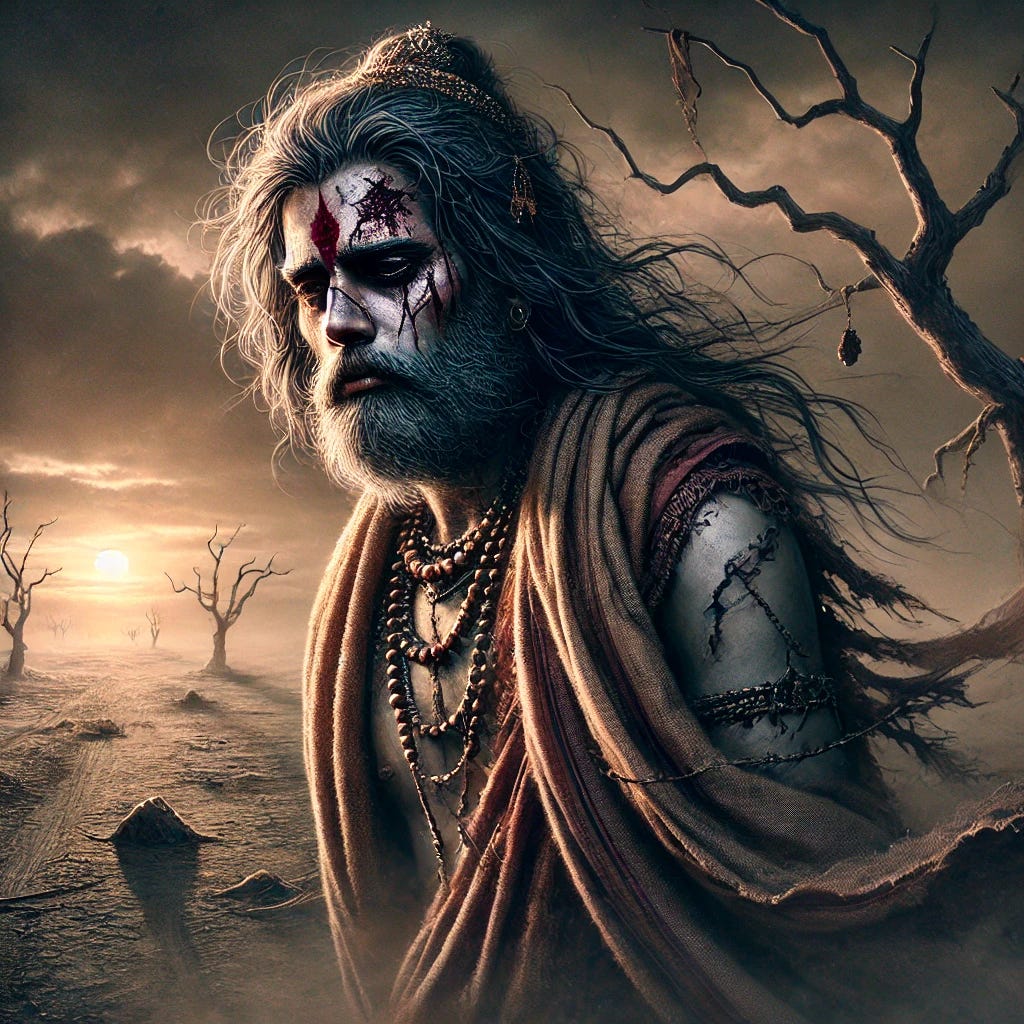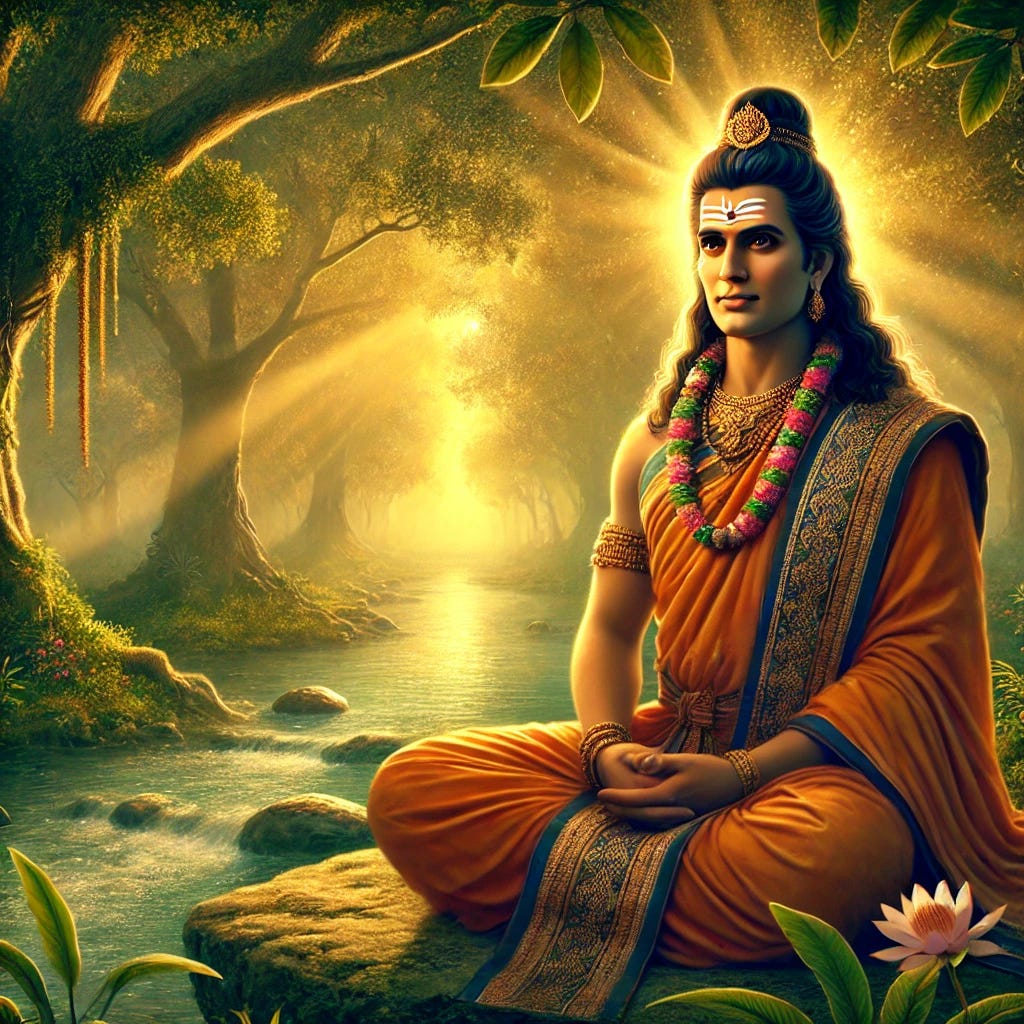Three lessons we can we learn from the story of Asvatthama
Asvatthama is depicted as a great villain. On the other hand, he went to live in Badarīkāśrama and will become one of the seven great sages in the next manvantara. How to reconcile these two sides?
Asvatthama is depicted in the Srimad Bhagavatam as a great villain, who broke the Ksatriya code and even ordinary moral laws in many ways. He killed the five sons of the Pandavas while they were sleeping, which deeply displeased Duryodhana, who he vowed to serve, he released the Brahmastra weapon not once, but two times, without knowing how to withdraw it, he intentionally tried to kill a woman and an unborn child, and so on.
On the other hand, he later gained the association of Vyasadeva and Nara-Narayana Rsi in Badarīkāśrama and was chosen to become one of the Saptarṣi, one of the great sages in charge of maintaining the principles of dharma all over the universe during the next Manvantara. After the events of the Mahabharata, Asvatthama became a great sage and is now considered practically immortal. He is destined to live in Badarīkāśrama until the beginning of the next manvantara (more than 150 million years from now) and then assume his role as one of the Saptarṣi for the 8th manvantara (306.72 million years). After that, he is supposed to continue living on the higher planets (Janaloka or higher) until the end of the universe, after which he may go back to Godhead.
We may have trouble reconciling these two sides. How is it that the killer of five innocent boys, who did so many other terrible things could become such an exalted person?
Let's examine these different sides of Asvatthama one by one:
Asvatthama as the son of Drona
Despite acting like a Ksatriya, Drona was originally a great and exalted Brahmana. As a qualified Brahmana, he had all knowledge from the Vedas, including military science, and thus when he saw himself in financial difficulties and humiliated by Drupada, he decided to become a Ksatriya. Normally, Brahmanas who don't have the means to maintain themselves as Brahmanas are advised to work as Vaisyas (because it is a non-violent occupation), but in some cases they may become Ksatriyas. Because Drona was such an exalted personality, he didn't degrade himself by it.
His wife, Kṛpī, was the daughter of Śaradvān, a great sage, and a very saintly lady. Drona and Kṛpī followed the process of Garbhadhana Samskara to beget their child, therefore Asvatthama was born a Brahmana with a divine nature, similar to his father and mother. He had the potential to learn the Vedas, just like his father, and also to become a great sage, just as his maternal grandfather.
Asvatthama fights in the battle of Kuruksetra
Asvatthama is described in the Bhagavad-gita as the "brother" of Arjuna. Naturally, they were not brothers by blood, but this indicates how both of them studied the military science under Drona. As Drona became a Ksatriya and started teaching the Kaurava princes, he also taught his son. Because they were all studying and practicing together, they became all brothers. In this way, Asvatthama followed a path similar to Drona: A Brahmana acting like a Ksatriya. Just as Drona remained on the side of the Kauravas, he also did and thus faced the Pandavas in the battle of Kuruksetra.
Later in the battle, the inevitable happened: Droṇa was killed. Under the instructions of Krsna, the Pandavas used a trick to defeat him, which was considered unfair by Asvatthama. There was no fault in the actions of the Pandavas, who acted under the supreme dharma, the direct order of Krsna, but Asvatthama considered this an injustice, and this feeling drove him on his rampage.
This is the first lesson we can learn from Asvatthama: How anger can cloud the judgment of even exalted persons and make them perform the most abominable actions. As Krsna explains in the Gita, answering the question of Arjuna:
"Arjuna said: O descendant of Vṛṣṇi, by what is one impelled to sinful acts, even unwillingly, as if engaged by force?
The Supreme Personality of Godhead said: It is lust only, Arjuna, which is born of contact with the material mode of passion and later transformed into wrath, and which is the all-devouring sinful enemy of this world." (Bg 3.36-37)
Asvatthama kills the five sons of the Pandavas
Asvatthama fought relentlessly desiring to avenge the death of his father by killing the Pandavas, but this was obviously impossible since the Pandavas were protected by Krsna. Because Asvatthama was blinded by rage, he couldn't see the superior arrangement of the Lord at works, how his father had been killed as a reaction to his own activities in supporting the irreligious plans of Duryodhana, and how he, by the mercy of Krsna, had gone back to Godhead after being killed by Dhrstadyumna. Like everyone else in the battle, Asvatthama had heard the Bhagavad-gita when Krsna spoke it to Arjuna, but due to his anger, he failed to consider its teachings.
Incapable of getting revenge by honest means, defeating the Pandavas in battle, Asvatthama decided to resort to irreligious means, by assassinating their sons during their sleep. Along with Kṛpa and Kṛtavarman, he conducted a night raid at the Pandava camp and beheaded the five boys. He thought this would satisfy Duryodhana, but he was mortified when he received the heads, understanding that the bloodline of the Kauravas was now finished. He thus died in great grief, deeply displeased with the actions of Asvatthama.
Asvatthama captured and punished
Seeing Draupadi crying due to the death of her sons, Arjuna promised to kill Asvatthama. He tried to run, but seeing Arjuna approaching on his chariot, Asvatthama feared for his life. He knew he would not be able to defeat Arjuna, and thus he resorted to another cowardly measure, invoking the Brahmastra, a weapon that he couldn't properly control, and using it against Arjuna.
The Brahmastra is a very dangerous weapon because it creates an atomic explosion that grows uncontrollably until retreated by a second mantra. Asvatthama didn't know how to retreat it, and this put the whole universe at risk. Fortunately, Arjuna was able to control the explosion by releasing his own Brahmastra and then retreating both.
He then captured Asvatthama and brought him to the camp, but Draupadi, supported by others, decided to forgive him. He was punished by having his hair shaved and the jewel he had on his forehead removed, but his life was spared, despite his serious crimes.
Asvatthama tries to kill Pariksit and Uttara with the Brahmastra
Humiliated and still grieving his father, he again tried to get revenge by releasing the Brahmastra again, this time aimed at Uttara, the daughter-in-law of Arjuna, who at the time was pregnant with Pariksit. He thus tried to kill the last descendant of the Pandavas, not caring about killing also a defenseless woman. This time, Krsna himself intervened, blocking the weapon and saving Pariksit.
Cursed by Krsna for 3000 years
After all these mistakes, Krsna finally decided that enough was enough. Asvatthama had abused his military power so many times, and Krsna decided to deprive him of it. That's the second lesson we can learn from the story: We all have certain powers and abilities, but if we fall under the influence of anger and use it to harm others, we will ultimately lose it and be punished, no matter how great we are. Even if we can escape the punishment of ordinary law, we can't escape the punishment of God.
Redemption and ascension to Badarīkāśrama
Krsna personally cursed Asvatthama to lose his powers and roam alone like an indigent, afflicted by all kinds of bodily pains. Some versions of the Mahabharata describe that he was cursed to roam "eternally" or until the end of Kali-yuga, but these accounts are exaggerated. In reality, Krsna cursed Asvatthama to suffer for 3000 years, enough for him to repent his sins and return to his good consciousness. Deprived of his military power and all types of false prestige, he returned to his original consciousness as a Brahmana and sage.
This is the third lesson we can learn from the story: In the spiritual path, there is always space for redemption.
No matter how serious a sin a person may have committed, if he or she sincerely repents, there is always the possibility of redemption. However, for this process to happen one may have to face some punishment to understand and repent his mistakes.
Reinstalled in this high consciousness, he was able to reach the higher-dimensional Badarīkāśrama, where Vyasadeva lives accompanied by Nara-Naraya Rsi and other great sages. This abode exists in a higher dimension that is not available to ordinary mortals.
Asvatthama becomes a great sage
Living in Badarīkāśrama, Asvatthama now dedicates himself to spiritual practice, becoming free from bodily identification and developing superior knowledge. By this process, he attained a level of existence similar to the inhabitants of Maharloka, with a very refined body, composed of subtle elements that is practically immune to the passage of time. In this quality, Asvatthama will be able to live for an extremely long period.
He is currently engaged in his spiritual practice, awaiting the beginning of the next manvantara, when he will accept the position of one of the seven great sages and will serve the Lord by spreading the principles of dharma all over the universe. We can see that he had this potential from the start, but to realize it, he had to surpass his material attachment and anger. Krsna of course knew that, and thus He corrected Asvatthama by cursing him, instead of just killing him like He did with many ordinary demons.
—
I have two other articles on Asvatthama, if you are interested you can also check them:
Is Asvatthama still alive today?
Srimad Bhagavatam #06: Asvatthama punished
—





Very interesting, thank you prabhu.
A couple of questions please:
1) In a previous article I believe you wrote Krishna was 88 during the battle of Kurukshetra? If I've remembered that correctly, then how were the pandavas' sons only teenagers at that time?
2) If our varna is born of our nature, and thus dictates our dharma, how were Drona and Ashvathama able to fight militarily and it not be adharmic?
3) Were there no other living sons of the Pandhavas to their other wives?
Thank you 🙏